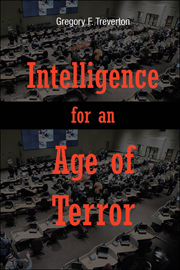Book contents
- Frontmatter
- Contents
- Preface
- Acronyms
- Intelligence for an Age of Terror
- 1 Introduction
- 2 The Changed Target
- 3 The Cold War Legacy
- 4 The Imperative of Change
- 5 The Agenda Ahead
- 6 The Special Challenge of Analysis
- 7 Many Customers, Too Many Secrets
- 8 Covert Action: Forward to the Past?
- 9 Rebuilding the Social Contract
- Notes
- Index
9 - Rebuilding the Social Contract
Published online by Cambridge University Press: 05 August 2012
- Frontmatter
- Contents
- Preface
- Acronyms
- Intelligence for an Age of Terror
- 1 Introduction
- 2 The Changed Target
- 3 The Cold War Legacy
- 4 The Imperative of Change
- 5 The Agenda Ahead
- 6 The Special Challenge of Analysis
- 7 Many Customers, Too Many Secrets
- 8 Covert Action: Forward to the Past?
- 9 Rebuilding the Social Contract
- Notes
- Index
Summary
The Church Committee stated it well three decades ago: “The United States must not adapt the tactics of its enemies. Means are as important as ends. Crisis makes it tempting to ignore the wise restraints that make men free. But each time we do so, each time the means we use are wrong, our inner strength, the strength which makes us free, is lessened.”
Because intelligence agencies operate in secret and because they engage in activities that are sensitive or even illegal at home, they depend on public trust. I first came to know intelligence in the 1970s through the Church Committee when that trust had been broken. The social contract had been broken then by revelations about excesses, both foreign and domestic – ranging from assassination plots against foreign leaders, to the covert CIA role in Chile and other countries, to illegal spying on Americans. Poignantly for me as a young person, the trust had been broken not only with the public at large but also with some of my then-young counterparts who worked in the intelligence agencies. More than once when I was riding the famous Blue Bird buses from CIA headquarters to downtown Washington, I had occasion to chat with young CIA officers who expressed their disappointment verging on disillusion: “They told me when I joined that the CIA didn't engage in assassinations, and now I found out that it did.”
- Type
- Chapter
- Information
- Intelligence for an Age of Terror , pp. 235 - 262Publisher: Cambridge University PressPrint publication year: 2009



